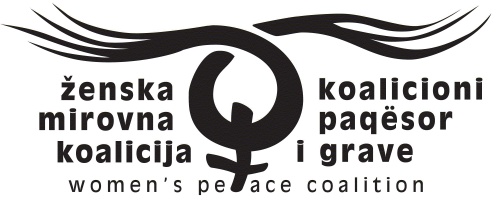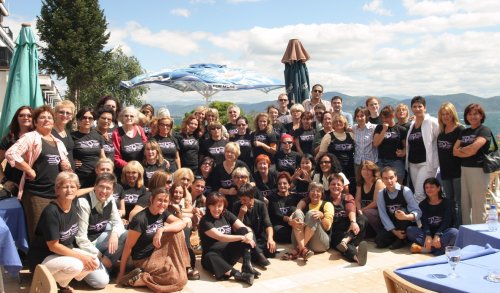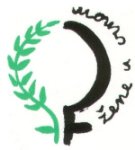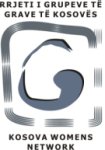LOOK AT THE PHOTOS
TRANSITIONAL JUSTICE- FEMINIST APPROACH
FROM ORGANIZED CRIME TO AN ORGANIZED LIE
ON THE TRIAL OF SUVA REKA
Nga krimi i organizuar deri të gënjeshtra e organizuar
Për gjykimin "Lënda: Suhareka"
LETTER TO THE KOSOVO WOMEN ACTIVISTS FOLLOWING THE SECOND CONFERENCE IN MACEDONIA, IN THE FALL OF 2007, AN ENORMOUS WISH TO WORK TOGETHER


Women's network Kosovo
(Pristina, Djakovica, Prizren, Srbica, Orahovac, Lipljan, Podujevo, Priluzje, Vucitrn, Pec)
www.womensnetwork.org
Women in black network SerbiaWomen`s Peace Coalition
(Velika Plana, Leskovac, Vranje, Pirot, Vlasotince, Zajecar, Kraljevo, Krusevac, Vrbas, Beograd, Novi Pazar)
www.zeneucrnom.org
THE PRINCIPLES OF THE WOMEN’S PEACE COALITION


The Kosovo Women’s Network and the Women in Black Network in Serbia started their cooperation and collaboration in March 2006. Recognition of our shared goals led to the launching of the Women’s Peace Coalition in May 2006 as an independent citizen’s initiative founded on women’s solidarity that crosses the divisions of ethnicity and religion, as well as state borders and barriers.
The Women’s Peace Coalition strives towards a just and sustainable peace and works for the inclusion of women in peace-building processes as equal partners, stressing the fact that women are not only victims of war, but dynamic actors in peace movements.
The Women’s Peace Coalition strongly advocates for the implementation of the United Nations Security Council Resolution 1325 and the advancement of women’s economical and social position, while opposing country-specific tendencies and regressive processes which are detrimental to our goals.
The Women’s Peace Coalition works with and includes all allies relevant to its cause, while simultaneously maintaining its autonomy. To achieve this, it forms alliances with those who accept WPC’s principles.
Kosova Women’s Network Women in Black Network in Serbia
Prishtina/Belgrade, May 2006
SECURITY, THE ACTIVITIES OF WOMEN IN BLACK AND UN SECURITY COUNCIL RESOLUTION 1325 / SIGURIA, AKTIVITETET E GRAVE NË TË ZEZA DHE R 1325 E KS TË KB
NOT IN OUR NAME! /
JO NË EMRIN TONË!
AWAKENING FROM THE NIGHTMARE OF THE PAST IN TEARS FOR SREBRENICA / ZGJIMI NGA ANKTHI I SË KALUARES ME LOTËT E SREBRENICËS
WOMEN’S PEACE PLATFORM FOR NEGOTIATIONS ON THE STATUS OF KOSOVO! / PLATFORMA PAQËSORE E GRAVE PËR BISEDAT PËR STATUSIN E KOSOVËS
WOMEN, PEACE, SECURITY
Fieldwork experiences – workshops, interactive lectures, campaigns, performances
Introduction
Since the very beginning of its activities, Women in Black, as a feminist and anti-militaristic organization, has been pledging for all forms of demilitarization, both on the institutional and the cultural and spiritual plan, and also through street actions, campaigns, publishing ventures, etc. All these have been recorded in our alternative history with large numbers of written documents.
Throughout 2005, we focused very intensively on the topic of peace, gender and security. Several regional conferences were organized; seminars / trainings were held in four regions of Serbia , during which we conducted many workshops concerning the interconnectedness of gender, peace and security. Moreover, in the course of 2005, we also launched numerous campaigns related to the Security Council Resolution 1325 ‘Women, Peace, Security’, as well as a large number of street actions, performances, etc. This is a brief account of activities (their course, etc.)
In all the regions, workshops were conducted on the various aspects of interconnectedness of gender, peace and security. The analyses of the above-mentioned workshop activities has led to the results that will be discussed further on.
The workshop participants were not only Women in Black activists: between one half and one third of the women attending almost all the workshops had never participated in any similar workshop or had never participated at Women in Black workshops. It is to be noted that all the participants had attended workshops on security for the first time. So far, at least one third of the participants had been actively involved in various forms of anti-militaristic activities organized by Women in Black (workshops, seminars, conferences), so that they were already familiar with many of the concepts related to peace.
Asked to brainstorm ideas concerning peace, the participants’ answers were twofold:
Negative peace: peace as the absence of war, probably due to their experience of armed violence in the preceding decade and due to the widespread presence of violence in the aftermath of war.
Positive peace: peace as the absence of war, but also as the absence of fear, violence and poverty…
The most frequent definition of peace given by the women was:
- The absence of the fear of violence; being able to move about and walk freely everywhere, at all times of day; the need to overcome isolation and restrictions – to travel to the neighboring countries of the former Yugoslavia, especially to Croatia, ‘to the seaside’; non-violence featured as a very important value put forward by the participants;
- inner peace: serenity, harmony, contentment, the beauty of living, sleeping soundly, undisturbed rest, birds singing, love and tenderness – it must be noted that the women explained their longing for inner peace as deriving from the fact that in the nineties, they were neither able nor did they want to allow themselves to indulge in quietude while the war was going on and while the atrocities were being covered up. In view of the fact that silence or downplaying the crimes still prevails, minimizing the accountability of the state they live in, some of the participants are still unable to attain inner peace, considering that peace is the balance between external and inner peace;
- Demilitarization: on the institutional level, ( a society without soldiers ad arms) and on the cultural and spiritual plan (demilitarization of the mind) ;
- Democracy: as the rule of law and justice, a balance on the personal and state level (‘democracy at home – democracy in the country’ ; freedom of thought and freedom of speech– human rights and women’s rights: absence of sexual discrimination and the right to education.
As an introduction to the topics of security, in each of the regions, we conducted a dynamic exercise / role-play ‘Money to spend’. The participants were divided into six groups and each group represented a kind of community they live in, which corresponds to the existing communities (the nuclear family, the extended family, students, single mothers with several children, unmarried couples with children) and the alternative community (friends, etc.). Within these communities, they were asked to decide on the roles they would take (their sex, age, profession, employment); each group was allotted a monthly budget amounting to the average income in Serbia; the budget items (food, bills, social life, contraception, drinks, cigarettes) and the cost of the items could not be changed. Other criteria were also set (the complete scenario will be presented as an appendix to this paper) .
What small conclusions did we arrive at?
- Women live in permanent economic insecurity: Most of them are unemployed, having just been made redundant, a large number of the participants work in the sphere of gray economy (part time jobs, petty contraband) – they have ‘the power’ to decide on the deployment of expenses, yet it is an illusive and oppressive power, men who fail to assume responsibility inasmuch as women give us the power that consumes our strength;
- Constant hardship and shortage of money to cover the basic needs: (food, rent, electricity bills), a complete overlooking of cultural needs (buying books, going to the cinema and theatre), a complete oblivion of women’s needs, travel is out of question (‘we have no possibility to travel except for attending such seminars’);
- A feeling of deep frustration and defeat: ‘this is not about role-play, these are our actual lives’; this is a direct blow to the brain – the most blatant confrontation with the reality’, or ‘this is horrible, this is the reality we face each month’;
- The feeling of humiliation: because of the permanent economic uncertainty and need, the majority of women do not experience their own dexterity as positive (‘this is part of the myth according to which the Serbs are a dexterous people, so it turns out that poverty is no social problem really, because the people always make do somehow’), because it is a burden that usually weighs upon women;
- The hardship and need lead to the return of traditional roles: ‘let the boys take the girls out’ or ‘let the boys buy them contraceptives’ or ‘if the get pregnant, let them get married and have children’ …;
- Women are tired of family obligations and prefer alternative communities: it is interesting that practically all the women in the first workshop within the regional seminars chose to live in alternative communities – a student and a female friend (afterwards we had to change the rules, i.e. to deploy the participants into the communities). This was not only a form of escape, but also the need for economic freedom and for democratization of the family.
- The feeling of helplessness transforms into humor, irony and laughter: however much at a certain point in this exercise, bitterness would reach a peak, cathartic activist rebellion would follow, provoked by laughter, and that actually reflects the reality, because, even in the most difficult periods in the nineties, humor and laughter, especially in activist women’s groups, could not have had a more remedial effect;
- Guilt feelings: because of the hardship and poverty they are in, the women feel guilty, especially in front of the children, although they are aware of the need to overcome those feelings, because the women are not to blame for the miserable circumstances, but rather the unjust system they live in (‘we must not look for culprits among the women, we have to point at the real culprits in this country’) and, of course, this calls for an ever-better organizing of women;
- The fear of conflict – the need for harmony in women’s communities: due to the constant economic threats and shortages and of the conflicts thus provoked in everyday life, due to the exhaustion caused by all this, the participants argued much less that it would have been expected during the exercises, especially while making decisions on the budget items. This seemed to be quite unrealistic compared to what happens in reality in the family communities. The absence of heated arguments and quarrels reflects the weariness from this type of responsibility and ‘power’. This is what happens in reality: women see women’s groups as idyllic oasis , as a refuge from the harsh reality, but also as shunning responsibility – we know that the frequent refusals to assume responsibility and power in women’s groups is not the reflection of genuine criticism of power and distancing from power, but, above all, the expression of helplessness, fear of power, not being used to having power, which calls for a joint effort to build different forms of power and contents of power and, above all – power as a mutual strength, solidarity and support. This also leads women to set very high standards to one another or to some other women, and , if these are not met, instead of conflict, as a creative solution, disappointment and escape often follow.
What does security mean for women?
The brainstorming of ideas revealed very similar contents to the definition of peace. It must be noted that the women never linked the idea of security to the mechanisms of oppression, primarily to the army and the police and armament, but rather, the majority of ‘definitions’ referred to humane security:
Security as freedom from constant threats: the absence of war, living without fear and violence, freedom of movement, stability, security, smiling children, homes, going for a walk at night unimpeded…
Economic security: employment, food, social justice, absence of oppression.
Political security: democracy, freedom of thought, freedom of choice, legitimacy, rule of law, solidarity, UN…
Security of the environment: eco-friendliness, environmentalism, unpolluted air and water…
Health security: health protection, accessibility of medical treatment…
Such responses, fraught with the need to be free from constant threats, are a consequence of the war experiences of the nineties, where all human rights were violated, primarily the right to live. There was no single reference to collective categories such as the nation, self-determination of the nation, the national culture being at peril, which indicates that these concepts and contents are products of the state / militarized security, the needs of the states and mechanisms of repression, and not the citizens’.
Do you feel safe? What poses a threat to your safety?
The discussions during the workshops revealed many common elements, although there were some specific regional features.
The common denominator in all the regions is that ;
- Women do not feel safe at all – they think that not even a minimum of human security has been achieved in this country;
- The state and its institutions pose a threat to women – the women do not trust any of the state agencies or government institution; the social climate (political, cultural and spiritual) is nearly identical to the one before the toppling of the regime, i.e. the system of values had remained unchanged – in some instances, only the people have changes, whereas in other, the people from the pervious regime are almost massively returning to power;
- Practically the only place where women feel safe are the women’s groups, especially in place where there exist strong autonomous women groups.
The security of women is most threatened by:
- Unemployment, by the ever-present fear of losing one’s job and being fired – this is the most acute cause of insecurity in East and South Serbia; ‘I have daily fears concerning my own security and that of my children’ , ‘economic security is the most important to me, because as feel as safe as much money I have’, ‘after 27 years of work, I found myself in the street’.
- The comportment of the police and judicial system: ‘The same people have remained in these institutions as before the change of regime’ , ‘how can we feel safe in a country whose Prime Minister was killed, because, if this happened to him, how are we to feel/’ (this is a very frequent statement in all the regions ); ‘the police are maltreating the citizens’;, ‘you call the police for help and they fail to come’; ‘it is clear that lustration should have been carried out, but it did not take place anywhere’; ‘I fear the police, I don’t know when they are going to stop me for no particular reason and maltreat me’;
- The legalization of pillage and wealth acquired in a criminal way: ‘the war mongers will not shun from anything in order to protect their wealth’, ‘this system protects the criminals and endangers the citizens’; ‘corruption and pillage reigns at all the levels of power’; ‘the police, the judiciary and the prosecutors are on the side of the thieves, and not of the ordinary citizens’;
- Nationalism, religious intolerance – the pressure of the religious communities is on the rise; fundamentalist tendencies are gaining momentum, and the hate of others (especially in Sandzak, but also elsewhere);
- the fear of offending the authorities and of the consequences that it can have on the existential level: ‘the majority remain silent, there is a general sense of apathy, people do not want to get involved’, ‘when I speak to people, I have the feeling that most of them are denouncers, like in the Milosevic era’ – this is particularly typical of Eastern Serbia;
- the lack of freedom of movement ‘I can only move freely within a circle of 100 meters in diameter, I cannot go freely anywhere, I always have to be escorted’ (the women of Serbian nationality from Orahovac, Kosovo);
- The restriction of the freedom of movement due to deep-rooted patriarchal prejudices regarding women: “as a women, I am not safe, I cannot go out at night’ (a woman of Albanian nationality from Orahovac, Kosovo);
- The unfulfilled expectations and hopes after the change of regime – this is a constant feature in all of the regions;
- The resentment toward the civic society women activists, especially those who seek accountability for war and the war crimes; their vilification by the state apparatus and the media: ‘the only difference comparing to the previous regime is that they do not have total control over all the officers of the state security and they are not afraid as was the case at the Milosevic time, and in this sphere, as everywhere else, you can feel a deteriorating system.
This part of the discussion revealed deep concern, so that the discussion about the ways of overcoming fear was generally very brief and insufficiently elaborated. Namely, for most of the women, this topic involves a painful confrontation with the reality and emotional exhaustion. However, these were the most frequent ways that women mentioned:
- The need for solidarity, support and understanding;
- Solidarity campaigns, both related to the concrete threats to women and to actions aimed at decreasing the general threats, with a particular emphases on the need for continual demands for handing over the war crimes suspects The Hague Tribunal and on the anti-corruption campaigns – women n consider that such campaigns have to be public, transparent and loud;
- Joint actions, exchange of ideas and discussing problems;
- The need to continue working on issues concerning human security, on the feminist anti-militaristic concept of security and on UN Resolution 1325 (‘Women, Peace, Security’).
Report t prepared by: Stasa Zajovic






